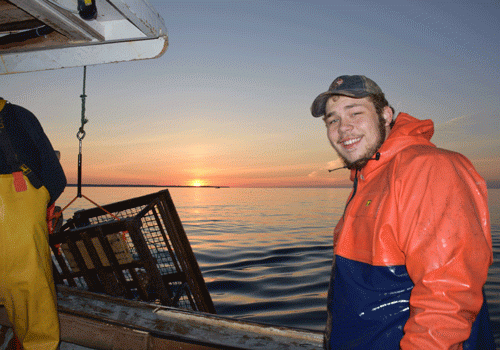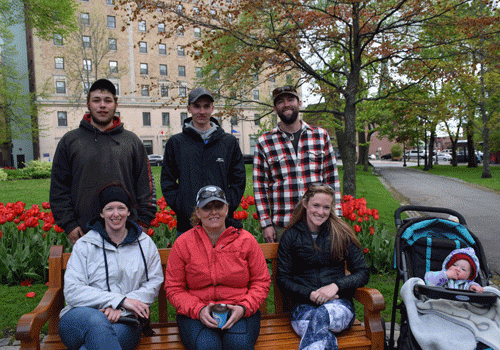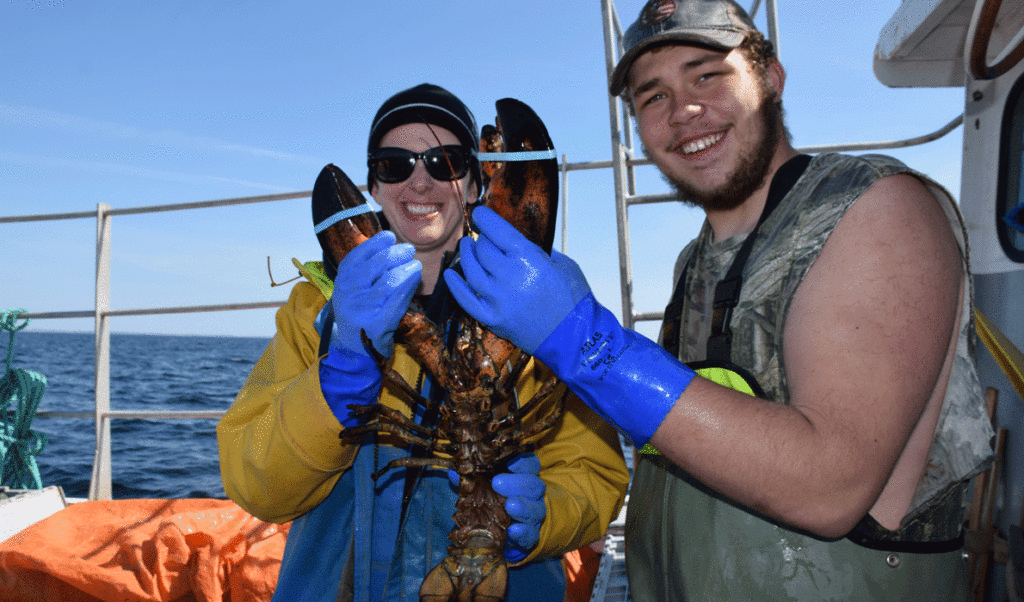
PHOTO: VAL PEACOCK
Zack Harvey of Swan’s Island at sunrise on a boat.
By Val Peacock
The annual Maine Fishermen’s Forum in Rockport offers opportunities for networking among those in the business. This year, a chance encounter with a Prince Edward Island lobsterman at the gathering led to a trip to the Canadian island province for two high school students, along with three high school teachers and myself.
The trip may be the first of many. As students and educators, we learned a lot about the island’s take on lobstering. High school students there don’t have much of a path into their lobster fishery. The lobster season is May and June when students are still in school. And, with transferable licenses, fishermen hoping to get into the fishery must buy out a retiring fisherman, which can be costly.
The two high school students from Maine, both holding student lobster licenses, visited the island through their participation in the Eastern Maine Skippers Program. The Skippers Program creates a largely hands-on curriculum for students from eight coastal high schools who want to pursue jobs in fishing and marine-related industries.
The students, Zack Harvey of Swan’s Island, who attends Mount Desert Island High School, and Mikael Stone, who attends Vinalhaven High School, learned about the history of the lobster fishery on PEI along with the island’s concerns for the future. The high school juniors were selected for the end-of-the-school-year trip through an essay contest.
The students were accompanied by teachers Kathryn Meyer of MDI High School, Haven Stone of North Haven Community School, Bryan Feezor of Vinalhaven High School, and myself, in my role with the Skippers Program.
After the nearly eight-hour drive, we arrived in PEI at midnight. At 4 a.m. the next day, we met up with Edwin McKee, the fisherman we’d met at the forum, along with his brother Henry and friend Robbie Jenkins at the wharf at Bay Fortune.
We split up between the boats and steamed out under a nearly full moon and on a flat calm bay. Meyer, who teaches English at MDI high, and student Zack were with me aboard Edwin’s boat, a 40-foot wooden vessel with a high bow and long deck. The boat makes setting and hauling all 273 traps in one day a little easier.
As soon as we stepped aboard, Zack began investigating Edwin’s set up. Edwin fishes with his wife, Freda, and Rachel, a helper from Grand Manan. We steamed slowly to the first buoy not far offshore. Rachel gaffed the buoy, handed it to Edwin who winched up the first trawl of six wooden traps, which he builds himself from trees on his property.
Zack went straight to the rail to check it out. He’d never seen a wooden trap before. He turned to me and asked, “Why do they fish wood traps? This is how it was in Maine 30 years ago.”
I told him to ask Edwin, because I didn’t know the answer.
And so began a day-long conversation between two fishermen, one at the beginning of his career, one at the end. One from Canada, one from the U.S. But both recognized something in each other that made them instant colleagues and friends.
Zack said, “It’s weird. I feel so at home on this boat.” By the time Edwin set back the second trawl, Zack had found his place at the rail, picking traps and resetting bait bags.
The next day, we toured a local plant that was processing the “canner” lobsters we’d landed the day before. The localness of their lobster system was interesting to us. As we headed home over the 9-mile bridge connecting PEI to the mainland, student Mikael Stone observed, “People on PEI are so nice.”
It’s true. They invited us to fish on their boats and stay at their houses. Over lobster dinners, they shared their hopes and concerns for their fishery. Much of our way home was spent comparing our fisheries and way of life.
We plan to return next spring with more students and hope we might connect with the aspiring future fishermen of PEI. Until then, as Zack and Mikael are just ramping up their summer fishing, they can’t help but remember a different pace and good friends that we experienced on our first trip to PEI.
Val Peacock is an education consultant for Rural Aspirations Project, a partner organization with Maine Center for Coastal Fisheries to run the Skippers Program.

The Eastern Maine Skippers contingent in Charlottetown, PEI.





